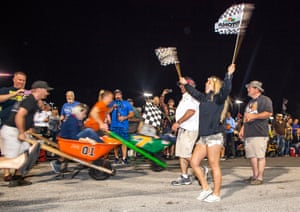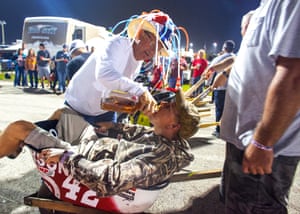Cush Revette paced down the starting line with a checkered flag and a full handle of Coulsons Rum, exhorting to the crowd with a carnival barker’s brio.
“Who’s next? I need two more dumb rednecks,” the 59-year-old from Tampa cried. “Speaking of two dumb rednecks, I see three right there.”
It was just before 11pm on Friday night in the infield of Daytona International Speedway, at the campground known as Cowboy Corner by the regulars who have pitched there year after year. Onlookers grilled food and sucked down canned beer around open bonfires as a DJ blasted Hank Williams Jr, Kid Rock and Blake Shelton from a pro-grade sound system. The wheelbarrow races were off and running.
The object is simple. Six runners push their partners in metal wheelbarrows around one of two traffic cones on the far end of a patch of asphalt. One by one, the crazy and brave emerged from the crowd and selected their vehicle. Revette made one final pass down the line, pouring rum down the throats of each passenger. They’d need it.
Revette says he’s overseen the wheelbarrow races on Friday and Saturday nights of Daytona 500 weekend for about 15 years since he assumed the duties from his predecessor. It’s a tradition that embodies the rollicking and well-lubricated spirit of a weeklong build-up where as many as 100,000 race fans pack every inch of the 180-acre infield to eat, drink and count down the days and hours to Sunday’s Daytona 500 – the Great American Race. It’s one big redneck throwdown, and perhaps the closest cultural analogue in America to Glastonbury in sheer scale and community spirit.

Only a few days prior, the Wall Street Journal had published a front-page story that described Nascar as a sport in freefall, citing a decline television viewership, on-site attendance and sponsorship dollars. The takedown became a primary talking point around the garage and the sport’s chattering class as the week moved forward. “With the first big race of the new season set for Sunday,” it read, “Nascar’s problems seem to have spun out of control.”
The article prompted responses from at least three of the sport’s top owners. “I think we all know that you can take a series of interviews and probably slant it any way you wanted to,” said Joe Gibbs, who was interviewed for the story but not quoted or referenced. “I just kind of felt like this thing was already going in a direction.”
From the roof of Daytona International Speedway you can see the Atlantic Ocean on the horizon as the smell of burnt rubber flirts with the salt-kissed breeze. Down by the oceanfront, a once-robust tourist destination is dotted by empty storefronts and blighted neighborhoods. It comes as no surprise that Trump won by more than 15% here in November, upsetting models and predictions by news outlets nationwide.
Nascar is a family sport built on generations coming to the racetrack. It’s passed down from parents to their children and their children’s children. A walk through the campgrounds packed tight with tents, TVs and luxury motorcoaches didn’t indicate a sport on the skids. Trendlines may be down from the sport’s bubble peak in the 90s, but the worm’s-eye view showed a sport with deep-running popular support, suggesting a loyalty that can’t be quantified by traditional metrics.

Support for the sitting president is even more robust in the infield among Nascar’s largely white, working-class fan base, where Trump flags and T-shirts and stickers are omnipresent. Yet for all the hand-wringing and branding of Trump supporters as hateful bigots, there’s little overt talk of politics throughout the weekend. People are there to have a good time with their friends. In an age of exceptional tribalism, sometimes you have to go to the other extreme to find the common ground.
There was nothing but high spirits and mirth at Cowboy Corner, where by 11.30pm on Friday the crowd had tripled in size as the action on the pavement grew even more intense. Some riders gripped the sides of the wheelbarrows with white-knuckled intensity. Others held on casually, a cigarette dangling from their lip. Some teams sprinted from the gate and made it around the cone and back unmolested. Sometimes the barrels tipped over, spilling their precious cargo to the asphalt. Skinned palms and elbows abound.
“Wake up in the morning, you look like a mummy all banjied up,” one onlooker said.
By midnight the crowd had seen enough and began to disperse. Revette said they’d do it again on Saturday night (they did) and the crowds would be even bigger (they were).
“This is the only thing at Daytona you can do for free,” Revette chirped. “You don’t win nothin’, it don’t cost nothin’.”



